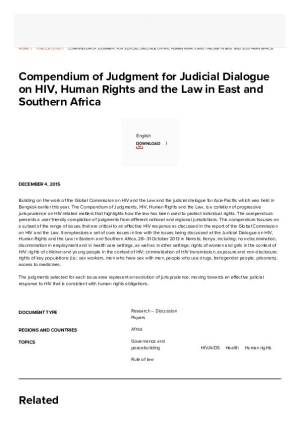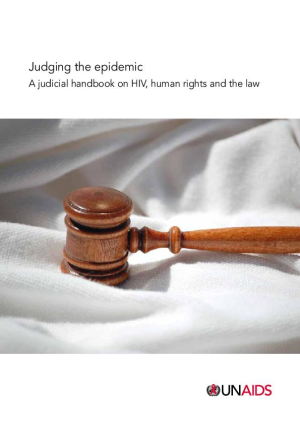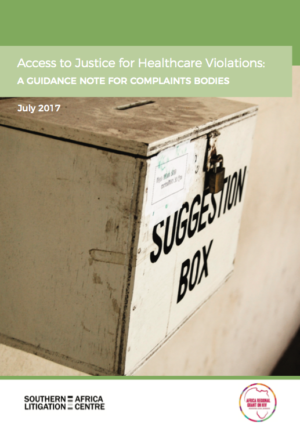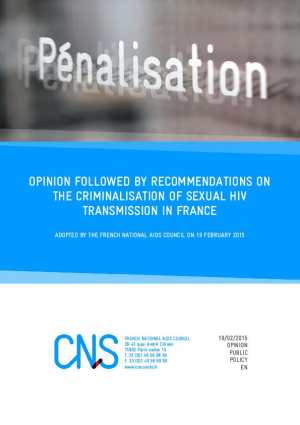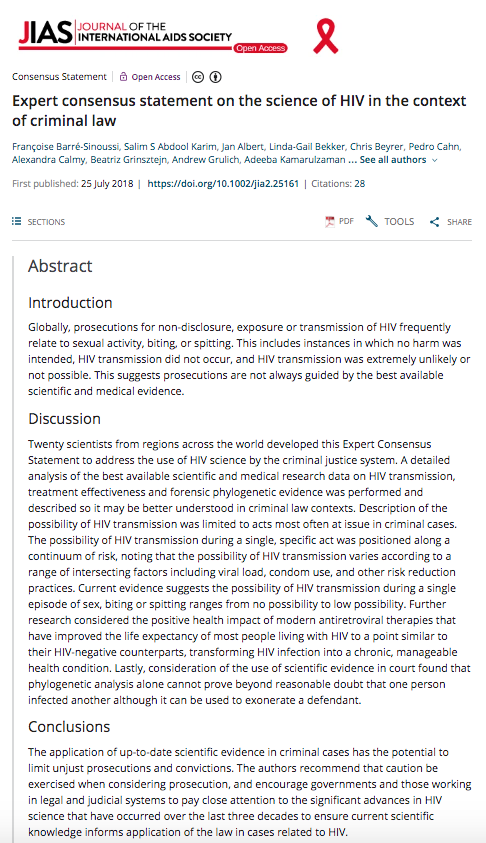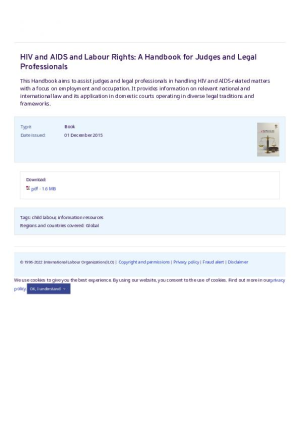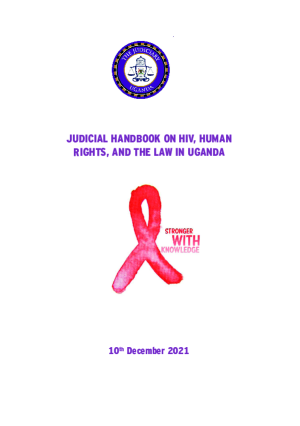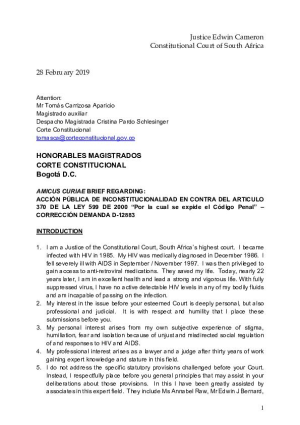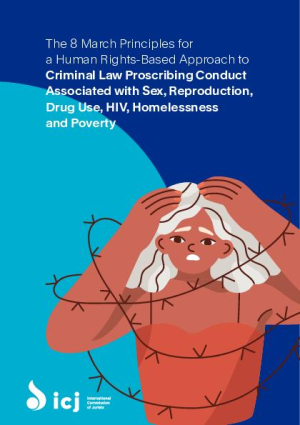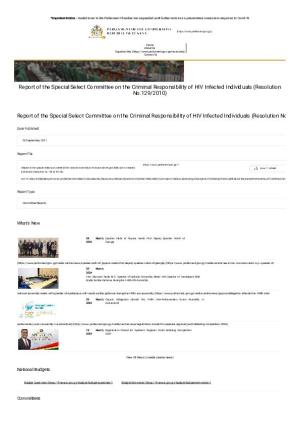Includes judgements from jurisdictions around the world, representing enabling jurisprudence on HIV-related issues, including judgements related to the criminalization of HIV transmission, exposure and non-disclosure.
Educating judges
Judicial resources
While there is no specific handbook for judges on criminalisation of HIV non-disclosure, exposure and transmission, there are numerous judicial resources framing HIV in a human rights context.
Judging the epidemic: A judicial handbook on HIV, human rights and the law
Prepared as a resource to help judges, magistrates, arbitrators and other judicial officers throughout the world adjudicate cases involving HIV-related issues. Based on international legal and human rights standards, the handbook contains examples of decided cases from different jurisdictions, good-practice advice and judicial rulings on HIV-related issues.
Access to Justice for Healthcare Violations: A Guidance Note for Complaints Bodies
This Guidance Note aims to provide concrete recommendations to alternative complaints mechanisms on how to provide safe, accessible and effective remedies for vulnerable and key populations who experience health rights violations.
Alternative complaints mechanisms are, for the present purposes, understood as those processes identified to be able to receive and determine complaints relating to health care outside of formal court procedures. These include healthcare regulatory bodies, such as health professions councils and nursing councils; decentralised complaints processes, such as complaints processes within ministries of health or health facility-based complaints mechanisms; and national human rights commissions and ombudspersons.
Opinion followed by recommendations on the criminalisation of the sexual transmission of HIV in France
Presents an assessment of the legal, ethical, societal and health issues raised by criminal proceedings brought in France for acts of transmission or exposure to the risk of sexual transmission of HIV.
Expert consensus statement on the science of HIV in the context of criminal law
Twenty scientists from regions across the world developed this Expert Consensus Statement to address the use of HIV science by the criminal justice system. Description of the possibility of HIV transmission was limited to acts most often at issue in criminal cases. The authors recommend that caution be exercised when considering prosecution, and encourage governments and those working in legal and judicial systems to pay close attention to the significant advances in HIV science that have occurred over the last three decades to ensure current scientific knowledge informs application of the law in cases related to HIV.
- Alternative links
- Czech: Expertní prohlášení k vědeckým poznatkům o HIV v kontextu trestního práva , French: Déclaration de consensus d'experts sur la connaissance scientifique relative au VIH dans le contexte du droit pénal, German: Expertenkonsens zur HIV-Wissenschaft im Kontext des Strafrechts, Mandarin: 專家共識聲明:刑法脈絡下的愛滋相關科學, Russian: Заявление об экспертном консенсусе в отношении научных данных о ВИЧ- инфекции в контексте уголовного права , Spanish: Declaración de Consenso de expertos sobre la ciencia relativa al VIH en el contexto del derecho penal
HIV and AIDS and Labour Rights: A Handbook for Judges and Legal Professionals
"This Handbook aims to assist judges and legal professionals in handling HIV and AIDS-related matters with a focus on employment and occupation. It provides information on relevant national and international law and its application in domestic courts operating in diverse legal traditions and frameworks." ILO
Judicial Handbook on HIV, Human Rights and the Law in Uganda
The Judicial Handbook on HIV, Human Rights and the Law in Uganda comprises of five parts that address the issues relating to HIV/AIDS and raises pertinent issues relating to its existence as may affect Judges’ decisions as well as possible recommendations for a start. Specifically, it has a background in which the current status of the HIV/AIDS epidemic and response to it is included.
- Part I enunciates the International Law and Human Rights Frameworks as applicable to HIV/AIDS in Uganda
- Part II concentrates on the National Law and Human Rights Frameworks as applicable to HIV in Uganda.
- Part III is about gaps/issues/shortfalls in national law and human rights frameworks as applicable to HIV and discusses policies on HIV.
- Part IV pertains to criminalization of transmission of HIV and its adverse effects.
- Part V is about things to remember when judging and adjudicating HIV cases, what the disposition of a judicial officer should be as well as the role of a judicial officer in the courtroom whilst handling such cases.
Constitutional Court of South Africa – Amicus Curiae Brief – Justice Edwin Cameron
Amicus Curiae Brief regarding the Public Action of Constitutional Challenge against Article 370 of Law 599 from 2000.
8 March Principles for a Human Rights-Based Approach to Criminal Law Proscribing Conduct Associated with Sex, Reproduction, Drug Use, HIV, Homelessness and Poverty
The Principles, published by the International Commission of Jurists are based on general principles of criminal law and international human rights law and standards. They seek to offer a clear, accessible and workable legal framework – as well as practical legal guidance – on applying the criminal law to conduct associated with: sexual and reproductive health and rights, consensual sexual activities, gender identity and expression, HIV non-disclosure, exposure or transmission, drug use and homelessness and poverty. The principles are additionally intended to address the detrimental impact of the criminalization of this conduct on health, equality and other human rights.
Submission to the International Commission of Jurists: Developing principles to address the detrimental impact on health, equality and human rights of criminalization with a focus on select conduct in the areas of sexuality, reproduction, drug use and HIV
This submission was prepared based on discussions that occurred during a meeting of the HIV JUSTICE WORDWIDE Steering Committee. The meeting focused on HIV criminalisation, noting that this frequently intersects with other issues including those being considered by ICJ.
Report of the Special Select Committee on the Criminal Responsibility of HIV Infected Individuals (Resolution No.129/2010)
Report from GUYANA'S Special Select Committee of Parliament on the Criminal Responsibility of HIV Infected Individuals that chose not to make the transmission of HIV a criminal act, concluding that the transmission or exposure will be a major set-back in the country's existing national HIV response, and would undermine the excellent work that is currently being done locally to address HIV.

